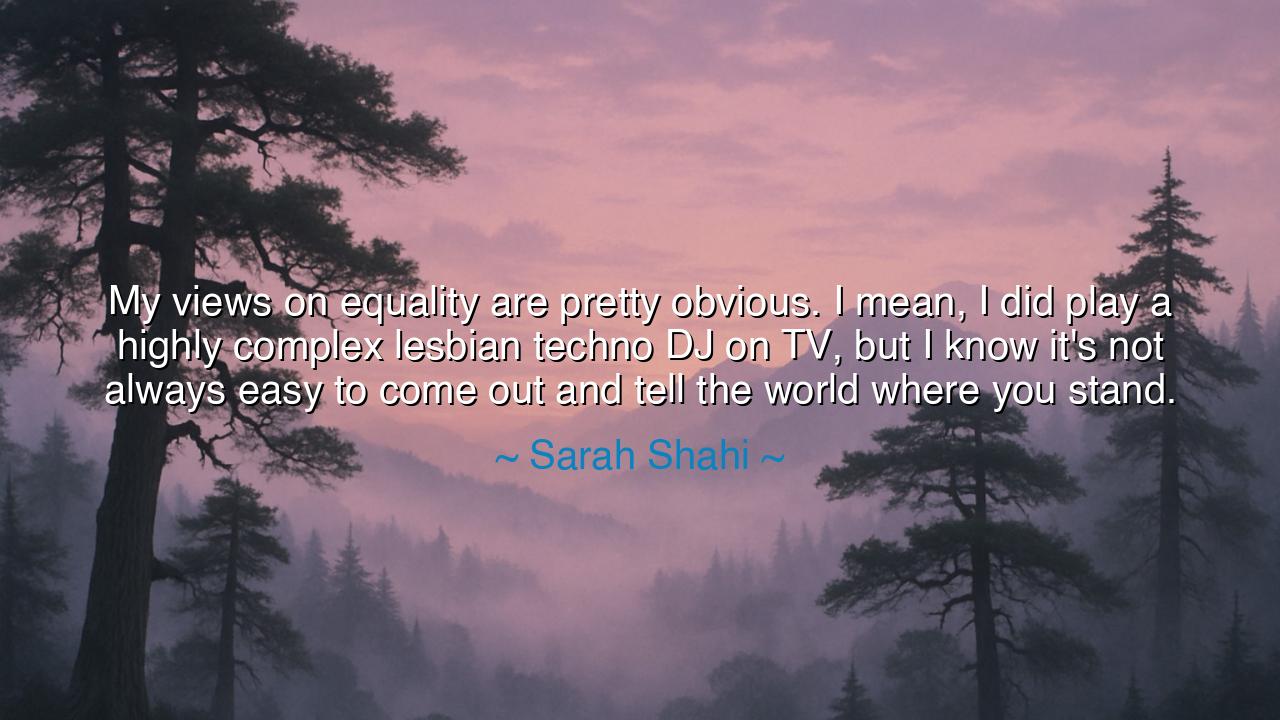
My views on equality are pretty obvious. I mean, I did play a
My views on equality are pretty obvious. I mean, I did play a highly complex lesbian techno DJ on TV, but I know it's not always easy to come out and tell the world where you stand.






In the bold and reflective words of Sarah Shahi, there shines both courage and compassion: “My views on equality are pretty obvious. I mean, I did play a highly complex lesbian techno DJ on TV, but I know it’s not always easy to come out and tell the world where you stand.” These words, though spoken with grace and humor, carry a truth of deep resonance. They speak of the power of representation, of standing for what is right even through art, and of the quiet bravery required to declare one’s beliefs in a world that often judges before it understands. In Shahi’s voice, we hear both the artist and the human being—the one who performs for the world’s eyes and the one who feels its gaze upon her.
The meaning of this quote is rooted in authenticity and empathy. Shahi acknowledges that while she has expressed her beliefs about equality through her craft—embodying a character who challenges convention and celebrates diversity—she also recognizes the profound difficulty of living openly and truthfully. To “come out and tell the world where you stand,” as she says, is not merely a statement of opinion; it is an act of courage. In every age, those who have dared to speak the truth of their hearts have faced resistance. Shahi honors both the artists who reflect society’s struggles and the individuals who live those struggles daily. Her words remind us that equality is not only an idea to be supported—it is a truth to be lived, and living it often requires bravery beyond measure.
The origin of this insight lies in Shahi’s own artistic journey. Through her role in television, particularly in series that explored LGBTQ+ identity, she became a voice—perhaps unintentionally—for understanding and inclusion. By portraying a “complex lesbian techno DJ,” she gave form to the inner worlds of those often unseen or misrepresented in media. Yet her words go beyond performance; they speak of the deeper responsibility of visibility. She recognizes that every portrayal, every statement of belief, carries weight. For those who live with the fear of rejection or judgment, seeing even one person—real or fictional—stand unashamed in their truth can be a beacon of hope. Shahi’s acknowledgment that this act “is not always easy” is her tribute to that quiet army of souls who, each in their own way, fight to exist authentically.
History too bears witness to this struggle. In the 1950s, Christine Jorgensen, one of the first Americans to publicly undergo gender affirmation surgery, became a symbol of transformation and courage. She did not set out to lead a movement; she merely lived her truth. Yet by doing so, she changed countless hearts and minds. Like Sarah Shahi’s statement, Jorgensen’s life reminds us that visibility—whether through art or existence—is a form of activism. The world often changes not through grand proclamations, but through the quiet endurance of those who refuse to be erased. Both women, in their own eras and ways, embody the truth that representation is revolution.
Shahi’s words also touch on the tension between art and identity. As an actress, she uses her craft to embody stories beyond her own, yet her choice to play a role representing marginalized experiences was itself an act of solidarity. Her humor—“my views on equality are pretty obvious”—disguises a profound truth: that empathy can be communicated not only in speeches or protests, but through storytelling. Artists throughout time, from Sophocles to Shakespeare, from Frida Kahlo to James Baldwin, have used their art to express the unspoken struggles of humanity. Shahi’s reflection continues this lineage, reminding us that art, when honest, does more than entertain—it awakens.
There is also humility in her words, a recognition that not all can speak as freely as she. “It’s not always easy to come out and tell the world where you stand,” she says, with empathy for those who still live in silence. This is the wisdom of compassion—to speak not as one above others, but as one who understands the burden of fear. The courage to stand for equality is not measured by volume, but by sincerity. Some march, others create, others simply endure—and each act is part of the greater symphony of justice. Shahi reminds us that advocacy begins not with judgment, but with understanding.
Therefore, O listener, take this lesson to heart: let your voice, your craft, your daily actions speak for equality. You need not be famous or powerful; the smallest gesture of truth ripples outward. Defend the right of others to live and love as they are. When you see someone hiding their light out of fear, be the one who kindles it gently. For every act of acceptance is a rebellion against hate, and every honest life is a work of art.
And so remember the enduring wisdom of Sarah Shahi: that standing for equality begins with the courage to be yourself, and with compassion for those still finding that courage. Whether through words, art, or simple kindness, each of us has the power to make the unseen seen, the unheard heard. To live truthfully is to shine a light in the world’s shadow—and when that light joins with others, the darkness begins to fade.






AAdministratorAdministrator
Welcome, honored guests. Please leave a comment, we will respond soon